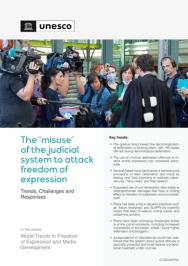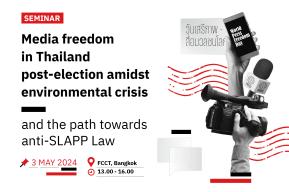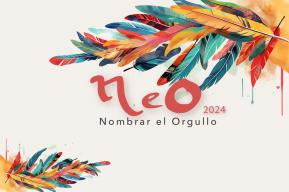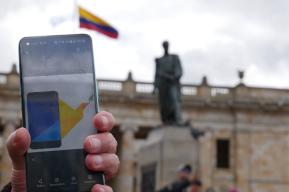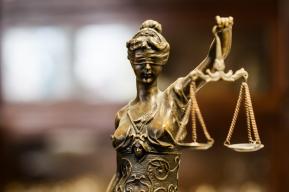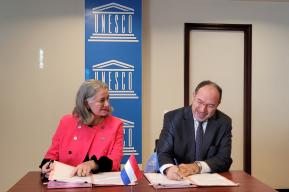Article
Defamation laws and SLAPPs increasingly “misused” to curtail freedom of expression
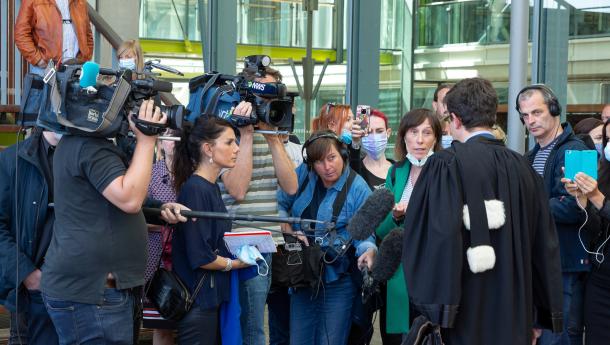
The global campaign to decriminalize defamation, which was gaining traction a decade ago, is now facing setback, including within countries reintroducing criminalization of defamation. As a result, 160 criminalize defamation, according to data published in a new issue brief of the World Trends Report on Freedom of Expression and Media Development, called “The “misuse” of the judicial system to attack freedom of expression. Trends, Challenges and Responses”.
The issue brief addresses current trends, challenges, and responses worldwide on defamation and related laws, with a particular focus on abusive legal practices. It also notes that in the last five years, a number of new laws have been passed to combat mis- and disinformation, cybercrime, or hate speech, but with potentially dire consequences for media freedom.
Furthermore, several countries have harshened or reintroduced provisions on libel, defamation, and insult by stating new laws intending to address cybersecurity, “fake news”, and hate speech. In addition to criminal defamation, there has been an increase in the use of civil defamation, which frequently results in disproportionate damages and disturbing effect on freedom of expression and the work of journalists.
The Issue brief also highlights that at least 57 laws and regulations adopted or amended since 2016 in 44 countries contain overly vague language or disproportionate punishments, endangering online freedom of expression and media freedom.
This analysis demonstrates that the issue of defamation, both criminal and civil, needs to be addressed in national legislations according to international standards, from the point of view of protecting freedom of expression and the vital work of journalists. UNESCO continues to call for the decriminalization of defamation and warns against the trends of the use of judicial systems to attack media freedom.
’Forum shopping’ and SLAPPs on the rise
The Issue brief also highlights the rise in abusive practices such as “forum shopping” which refers to the practice of selecting the court in which to bring an action based on the prospect of the most favourable outcome, even when there is no or only a tenuous connection between the legal issues and the jurisdiction.
Strategic Lawsuits Against Public Participation (SLAPPs) by powerful actors who want to silence critical voices and undermine scrutiny have been on the rise in different regions. They have garnered significant attention from advocates and international bodies, particularly in Europe.
The real objective of SLAPPs is not to win a court case, but to overwhelm the defendant through protracted legal proceedings, excessive costs – even at the risk of bankruptcy – and the related psychological burden. SLAPPs focused on defamation charges are frequently used to discourage journalists from advancing their work by preventing the publication or removal of certain content and discouraging others from covering the same issues.
Aimed at judicial actors and law makers, the issue brief also provides definitions, international standards, and landmark jurisprudence from the main regional human rights courts related to defamation, as well as good practices and recommendations for decriminalisation.
The use of judicial proceedings against journalists reporting on public interest matters is a growing threat to press freedom around the world. Powerful individuals, corporations, and government officials have in recent years adopted this tactic to silence and harass independent journalists. Their legal defence is not only important on an individual level, but more broadly to prevent ideas and information from being removed from the public space.
Regional breakdown shows worrying trends
A breakdown of the data in the Issue brief shows that defamation is still a criminal offence in 39 of Africa’s 47 countries. In Asia and the Pacific, 38 of 44 states retain criminal defamation, with six having repealed it and one advancing a partial repeal.
In Central and Eastern Europe, there has been an increased use of criminal defamation laws, which are in force in 15 out of the region’s 25 states, with a majority of them including the possibility of custodial sanctions. Ten countries have abolished all general provisions against defamation and insult, and four more have implemented a partial decriminalisation.
Criminal defamation offences persist in 29 of the 33 Latin America and Caribbean states and continues to be weaponized against journalists and bloggers. In Western Europe and North America, criminal defamation remains in the statutes of 20 out of the 25 states, most retaining custodial sanctions. Between 2003 and 2018, five countries abolished criminal defamation and insult laws, and another partially repealed one.
Against this scenario, it is advised that states should repeal criminal defamation laws and replace them with appropriate civil defamation legislation in line with international standards. Civil society organisations and media actors must also engage in advocacy and awareness-raising campaigns to mobilise the public and ensure that international and regional judgments are fully implemented at national level. At the same time, they can have a significant impact on pushing for the abolition of criminal defamation and countering backsliding. Finally, strategic litigation and legal support for journalists are also critical for encouraging them to continue their work and can result in concrete and positive legal and policy change.
